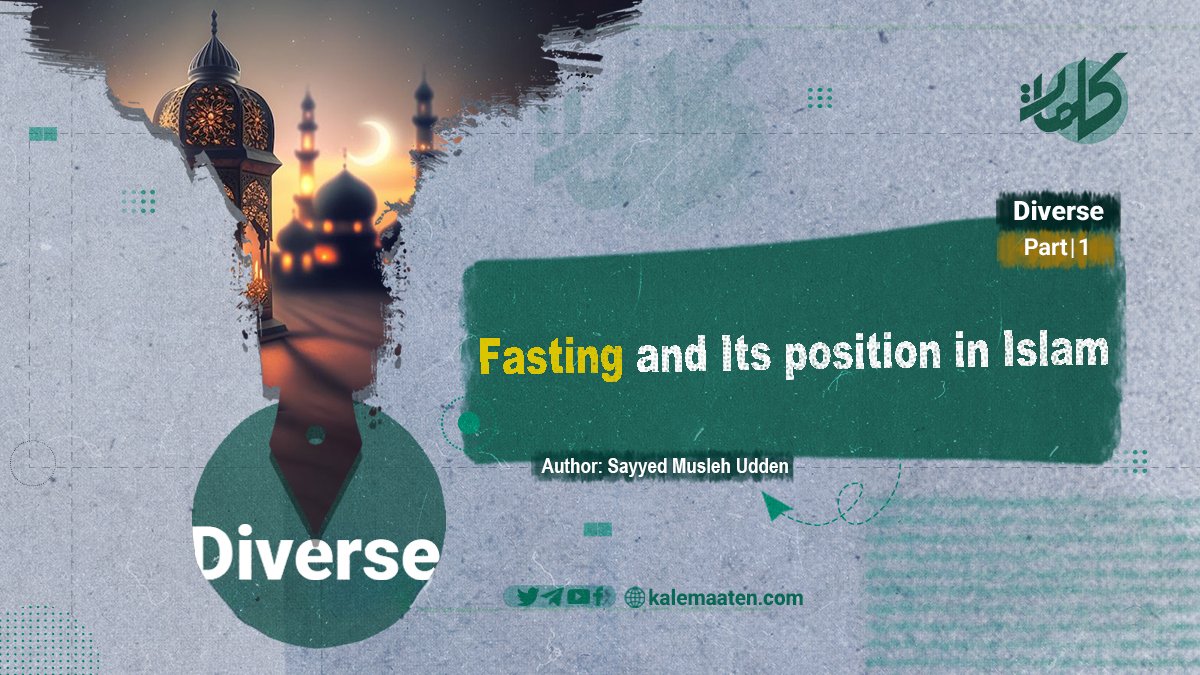
Author: Sayyed Musleh Uddin
Fasting and Its Position in Islam (Part One)
Abstract
The Almighty Allah, in accordance with His Lordship, has prescribed a series of acts of worship and moral duties to guide humanity and help them reach their full potential. Through the practice of these acts and the fulfillment of these duties, one can achieve the perfection for which they were created and obtain divine blessings. As long as a person is trapped by moral vices and engaged in evil and wrongful acts, their spiritual and moral energies remain dormant, not yet active. Without this activation and the manifestation of talents, due to the lack of harmony with the unseen world, they will be unable to experience the pleasures and blessings that lie beyond.
The blessed month of Ramadan presents a precious opportunity for humans to fulfill a series of obligatory acts of worship, thereby purifying their inner selves and enhancing the illumination of the earth. During this time, people can rise to such spiritual heights that they feel the presence of the Holy Lord even more intensely than the angels, particularly during the blessed nights when the distance between the earth and the heavens is at its minimum. All of these achievements are attributed to fasting and abstinence, which are the most significant acts of worship in Ramadan.
One of the noble rulings in Islam is fasting, which, like prayer and other divine commandments, plays a crucial role in the individual and social development of human beings. Islam considers fasting as one of the means of promoting both physical and spiritual health, a concept directly mentioned in the Qur’an and supported by many Islamic narrations. Today, the World Health Organization also recognizes spirituality as one of the key aspects of health, emphasizing its impact on overall well-being.
Introduction
Psychological and emotional factors, alongside various bodily systems—such as the immune, nervous, endocrine, and digestive systems—can significantly influence human health. Based on the Qur’anic verses, hadiths, and Islamic teachings, the importance and special status of health in Islam can be understood.
Islam, while offering guidelines for physical health, also provides essential instructions for the spiritual and mental well-being of humans. These guidelines have been strongly emphasized by the sacred lawgiver, with numerous recommendations for their implementation. Both body and soul have specific needs, and from a divine perspective, the primary focus of humans should be nourishing the soul and maintaining its health. Just as Allah has mentioned in the final heavenly book, the Qur’an, that the purpose of human creation is worship and servitude, true servitude and worship can only be achieved when physical and, in particular, psychological health is ensured.
If the Qur’an states that worship is the goal of creation, it certainly implies that Allah is concerned with the health of His servants. A healthy body, both physically and mentally, is essential for proper worship. Every halal (permissible) and haram (forbidden) command of Allah, as stated in the Qur’an and hadiths, carries benefits and harms for both the soul and the body, resulting in positive or negative effects. Islam has placed great importance on health and wellness, urging its followers to adhere to these practices. Many of the acts of worship prescribed by Islam, particularly fasting, are beneficial for both the body and, especially, the mind, thereby ensuring the mental health of individuals.
Fasting can be considered one of these practices, which has also been common in previous religions. The practice of fasting, alongside early rising for prayer, promotes both physical and spiritual well-being, remedying many psychological issues caused by incorrect habits and eliminating them entirely.
Concept Clarification
1. The word “fasting” (صوم) originally refers to abstaining from any activity, whether eating, speaking, or walking. For example, “صائم” (a fasting person) refers to a horse that stops both walking and eating grass.
2. The essence of fasting is abstaining from any action, be it eating, speaking, or walking. Islamic fasting specifically refers to abstinence from food and other specific things outlined in Islamic jurisprudence.
The word “صوم” (fasting) in its linguistic sense means abstinence from action. For example, fasting from eating, drinking, etc. This is why the word “صمت” (silence) is also referred to as fasting because it denotes abstaining from speaking. It is also said that anything that ceases movement is referred to as fasting, such as “صامت الريح,” meaning the wind has ceased to move. Therefore, fasting in linguistic terms refers to abstinence, avoidance, and self-restraint.
Fasting
«يَا أَيُّهَا الَّذِينَ آمَنُوا كُتِبَ عَلَيْكُمُ الصِّيَامُ كَمَا كُتِبَ عَلَى الَّذِينَ مِن قَبْلِكُمْ لَعَلَّكُمْ تَتَّقُونَ.» Translation: “O you who have believed, decreed upon you is fasting as it was decreed upon those before you, that perhaps you will become righteous.” (3)
Continues…


